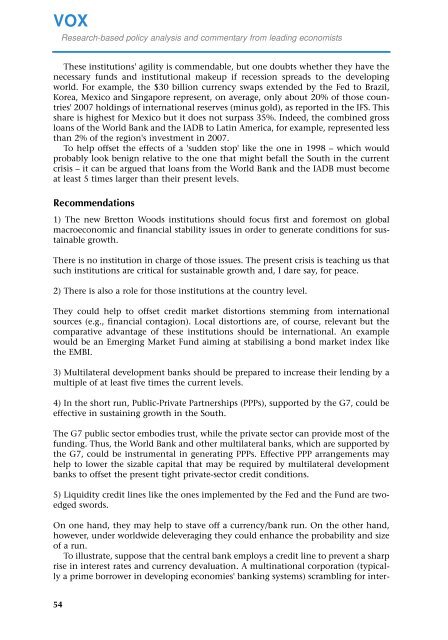What G20 Leaders Must Do To Stabilise our Economy and Fix ... - Vox
What G20 Leaders Must Do To Stabilise our Economy and Fix ... - Vox
What G20 Leaders Must Do To Stabilise our Economy and Fix ... - Vox
You also want an ePaper? Increase the reach of your titles
YUMPU automatically turns print PDFs into web optimized ePapers that Google loves.
VOXResearch-based policy analysis <strong>and</strong> commentary from leading economistsThese institutions' agility is commendable, but one doubts whether they have thenecessary funds <strong>and</strong> institutional makeup if recession spreads to the developingworld. For example, the $30 billion currency swaps extended by the Fed to Brazil,Korea, Mexico <strong>and</strong> Singapore represent, on average, only about 20% of those countries'2007 holdings of international reserves (minus gold), as reported in the IFS. Thisshare is highest for Mexico but it does not surpass 35%. Indeed, the combined grossloans of the World Bank <strong>and</strong> the IADB to Latin America, for example, represented lessthan 2% of the region's investment in 2007.<strong>To</strong> help offset the effects of a 'sudden stop' like the one in 1998 – which wouldprobably look benign relative to the one that might befall the South in the currentcrisis – it can be argued that loans from the World Bank <strong>and</strong> the IADB must becomeat least 5 times larger than their present levels.Recommendations1) The new Bretton Woods institutions should focus first <strong>and</strong> foremost on globalmacroeconomic <strong>and</strong> financial stability issues in order to generate conditions for sustainablegrowth.There is no institution in charge of those issues. The present crisis is teaching us thatsuch institutions are critical for sustainable growth <strong>and</strong>, I dare say, for peace.2) There is also a role for those institutions at the country level.They could help to offset credit market distortions stemming from internationals<strong>our</strong>ces (e.g., financial contagion). Local distortions are, of c<strong>our</strong>se, relevant but thecomparative advantage of these institutions should be international. An examplewould be an Emerging Market Fund aiming at stabilising a bond market index likethe EMBI.3) Multilateral development banks should be prepared to increase their lending by amultiple of at least five times the current levels.4) In the short run, Public-Private Partnerships (PPPs), supported by the G7, could beeffective in sustaining growth in the South.The G7 public sector embodies trust, while the private sector can provide most of thefunding. Thus, the World Bank <strong>and</strong> other multilateral banks, which are supported bythe G7, could be instrumental in generating PPPs. Effective PPP arrangements mayhelp to lower the sizable capital that may be required by multilateral developmentbanks to offset the present tight private-sector credit conditions.5) Liquidity credit lines like the ones implemented by the Fed <strong>and</strong> the Fund are twoedgedswords.On one h<strong>and</strong>, they may help to stave off a currency/bank run. On the other h<strong>and</strong>,however, under worldwide deleveraging they could enhance the probability <strong>and</strong> sizeof a run.<strong>To</strong> illustrate, suppose that the central bank employs a credit line to prevent a sharprise in interest rates <strong>and</strong> currency devaluation. A multinational corporation (typicallya prime borrower in developing economies' banking systems) scrambling for inter-54














